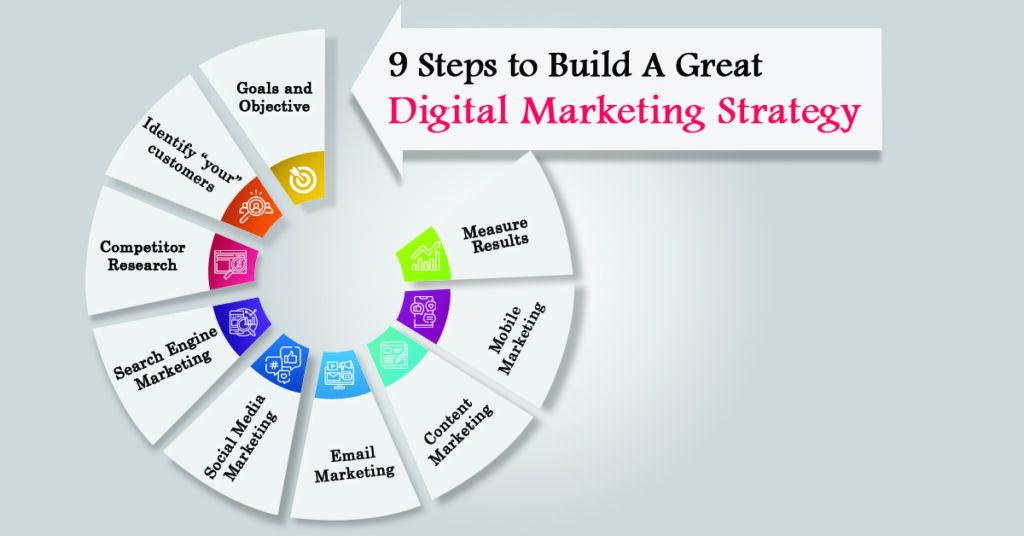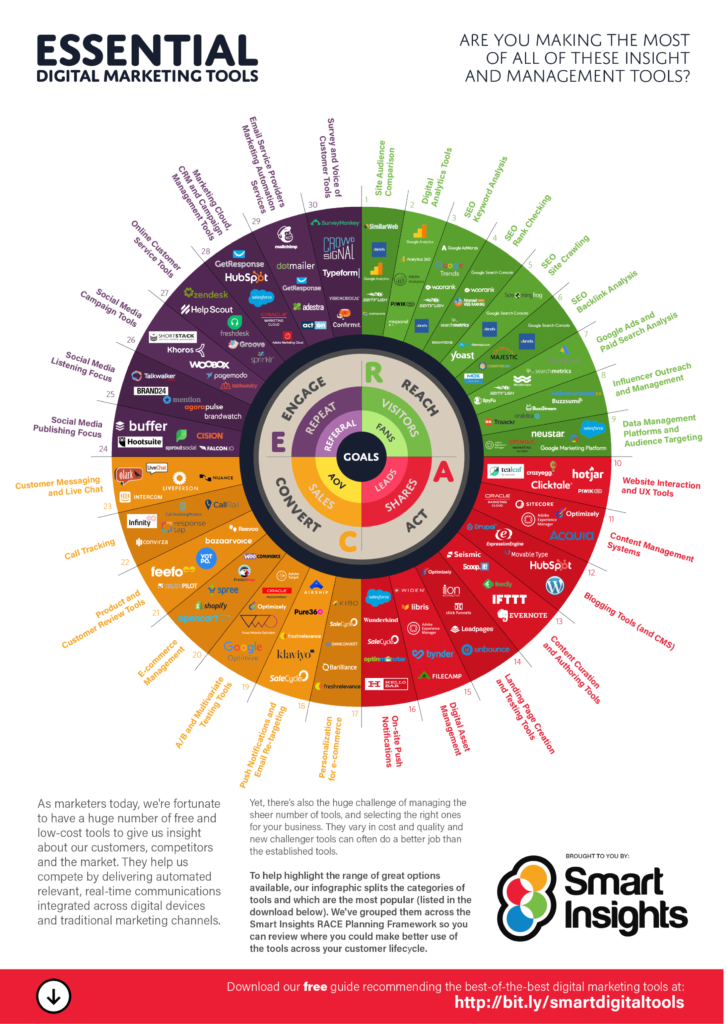In today’s digital age, businesses must have an online presence to stay competitive. Digital marketing refers to the use of digital channels to promote products or services to potential customers. The goal of digital marketing is to reach as many people as possible through various digital platforms, including social media, search engines, and email.
One of the primary benefits of digital marketing is that it is cost-effective. Compared to traditional advertising methods like television or print, digital marketing channels are much less expensive. Additionally, digital marketing allows businesses to target specific audiences, which can lead to higher conversion rates.
Digital Marketing Tools: A Comprehensive Guide
Digital marketing tools are essential for businesses that want to succeed in the online marketplace. There are many different tools available, each designed to help businesses achieve their marketing goals. In this section, we will explore some of the most popular digital marketing tools and how they can benefit a business.
Google Analytics
Google Analytics is a web analytics service that tracks and reports website traffic. It provides valuable insights into how visitors interact with your website, including information on their behaviour, demographics, and location. With this data, businesses can identify areas of their website that need improvement and adjust their marketing strategies accordingly.
SEMrush
SEMrush is a comprehensive digital marketing tool that offers a range of features, including SEO, PPC, and social media management. With SEMrush, businesses can conduct keyword research, analyse their competitors, and track their rankings on search engines. It also provides insights into social media performance and allows businesses to schedule and publish content on multiple platforms.
Hootsuite
Hootsuite is a social media management tool that allows businesses to manage multiple social media accounts from a single dashboard. With Hootsuite, businesses can schedule and publish posts, track engagement metrics, and monitor brand mentions. It also offers collaboration features that allow multiple team members to manage social media accounts together.
Mail chimp
Mail chimp is an email marketing tool that enables businesses to design and send email campaigns to their subscribers. With Mail chimp, businesses can create customized templates, segment their audience, and track email performance metrics like open and click-through rates. It also offers integrations with other marketing tools like Shopify and Salesforce.
Canva
Canva is a graphic design tool that allows businesses to create professional-looking graphics and visual content. With Canva, businesses can design social media posts, infographics, and marketing materials like flyers and brochures. It offers a range of templates and design elements, making it easy for even non-designers to create high-quality graphics.
Buffer
Buffer is a social media scheduling tool that allows businesses to schedule and publish posts on multiple platforms. With Buffer, businesses can create a content calendar, schedule posts in advance, and track engagement metrics. It also offers analytics features that provide insights into post performance and audience engagement.
Google AdWords
Google AdWords is an advertising platform that allows businesses to create and display ads on Google search results pages. With AdWords, businesses can target specific keywords and audiences, set budgets and bids, and track ad performance metrics like click-through rates and conversion rates. It is an effective way for businesses to reach potential customers who are actively searching for their products or services.
Ahrefs
Ahrefs is an SEO tool that allows businesses to analyse their website’s backlink profile and track their rankings on search engines. It offers a range of features, including keyword research, site audits, and competitor analysis. With Ahrefs, businesses can identify opportunities to improve their SEO performance and stay ahead of their competitors.
Digital Marketing Best Practices
In addition to using digital marketing tools, businesses must also follow best practices to achieve their marketing goals. Below are some best practices that every business should consider when implementing a digital marketing strategy:
Define Your Goals and KPIs
Before starting any digital marketing campaign, businesses must define their goals and key performance indicators (KPIs). This will help them track their progress and determine whether their campaigns are successful. Some common goals and KPIs include website traffic, conversion rates, social media engagement, and email open rates.
Know Your Audience
To create effective digital marketing campaigns, businesses must know their audience. This includes understanding their demographics, interests, and online behaviours. By knowing their audience, businesses can tailor their marketing messages to resonate with them and increase the likelihood of conversions.
Create High-Quality Content
Content is king in digital marketing. Businesses must create high-quality content that provides value to their audience. This can include blog posts, videos, social media posts, and email newsletters. High-quality content can help businesses establish themselves as thought leaders in their industry and build trust with their audience.
Use Multiple Channels
To reach as many people as possible, businesses should use multiple digital marketing channels. This can include social media, search engines, email, and display advertising. By using multiple channels, businesses can reach potential customers at different stages of the buying journey and increase the likelihood of conversions.
Test and Optimise
Digital marketing is an iterative process. Businesses must constantly test and optimise their campaigns to improve their performance. This can include A/B testing different ad creatives, optimising landing pages, and tweaking email subject lines. By testing and optimising their campaigns, businesses can identify areas of improvement and increase their ROI (return on investment).
Digital Marketing Strategies

Search Engine Optimization (SEO)
SEO is the process of optimising a website to rank higher in search engine results pages (SERPs). By ranking higher in search results, businesses can attract more organic traffic to their website. Some common SEO strategies include optimising on-page elements like title tags and meta descriptions, creating high-quality content, and building back-links.
Pay-Per-Click (PPC) Advertising
PPC advertising involves placing ads on search engine results pages, social media platforms, and other websites. Furthermore Advertisers only pay when someone clicks on their ad. This can be an effective way to drive traffic to a website and generate leads. Some popular PPC platforms include Google AdWords, Bing Ads, and Facebook Ads.
Social Media Marketing
Social media marketing involves using social media platforms like Facebook, Twitter, and LinkedIn to promote a business’s products or services. By posting engaging content and interacting with followers, businesses can build a loyal following and increase brand awareness.
Email Marketing
Email marketing involves sending promotional messages to a list of subscribers. This can include newsletters, promotional offers, and product updates. By nurturing leads through email, businesses can increase the likelihood of conversions.
Content Marketing
Content marketing involves creating and distributing valuable content to attract and retain a target audience. This can include blog posts, videos, infographics, and whitepapers. By providing value to their audience, businesses can build trust and establish themselves as thought leaders in their industry.
Conclusion
As an aspiring digital marketing apprentice, it’s important to understand the various tools and strategies available to businesses in the digital marketing landscape. By familiarising yourself with the best practices and tools outlined in this article, you can develop the skills and knowledge necessary to help businesses improve their online presence, attract more leads, and ultimately drive conversions. Whether you’re interested in SEO, PPC advertising, social media marketing, or email marketing, there are many exciting opportunities available in the world of digital marketing. With dedication and hard work, you can become a skilled digital marketing professional and make a meaningful impact in the industry.
Was this useful? Download our free digital marketing EPA ebook here



